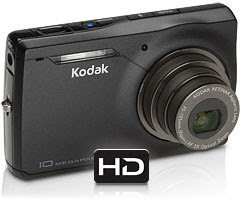Midnight Compression

One good indicator of whether you'll get sharp photos from a camera is if the camera lets you adjust the image quality setting. This is generally found as a menu option called JPEG Compression. Inexpensive digital cameras generally don't allow you to adjust JPEG compression. Other cameras let you choose different compression levels, such as "Standard" or "Fine." Choosing the "fine" setting results in slightly larger image files, as the camera's processor isn't squeezing your image file into a smaller "standard" setting. If you visit Flickr and use their Camera Tracker, you can track down a specific camera and view the output quality. (Check out full-size versions, not the default snapshot size). Then see if the image quality meets your expectations -- and visit the manufacturer's website to see if the camera's specs list several JPEG compression levels. Don't confuse this with image size. Most cameras permit you to se




